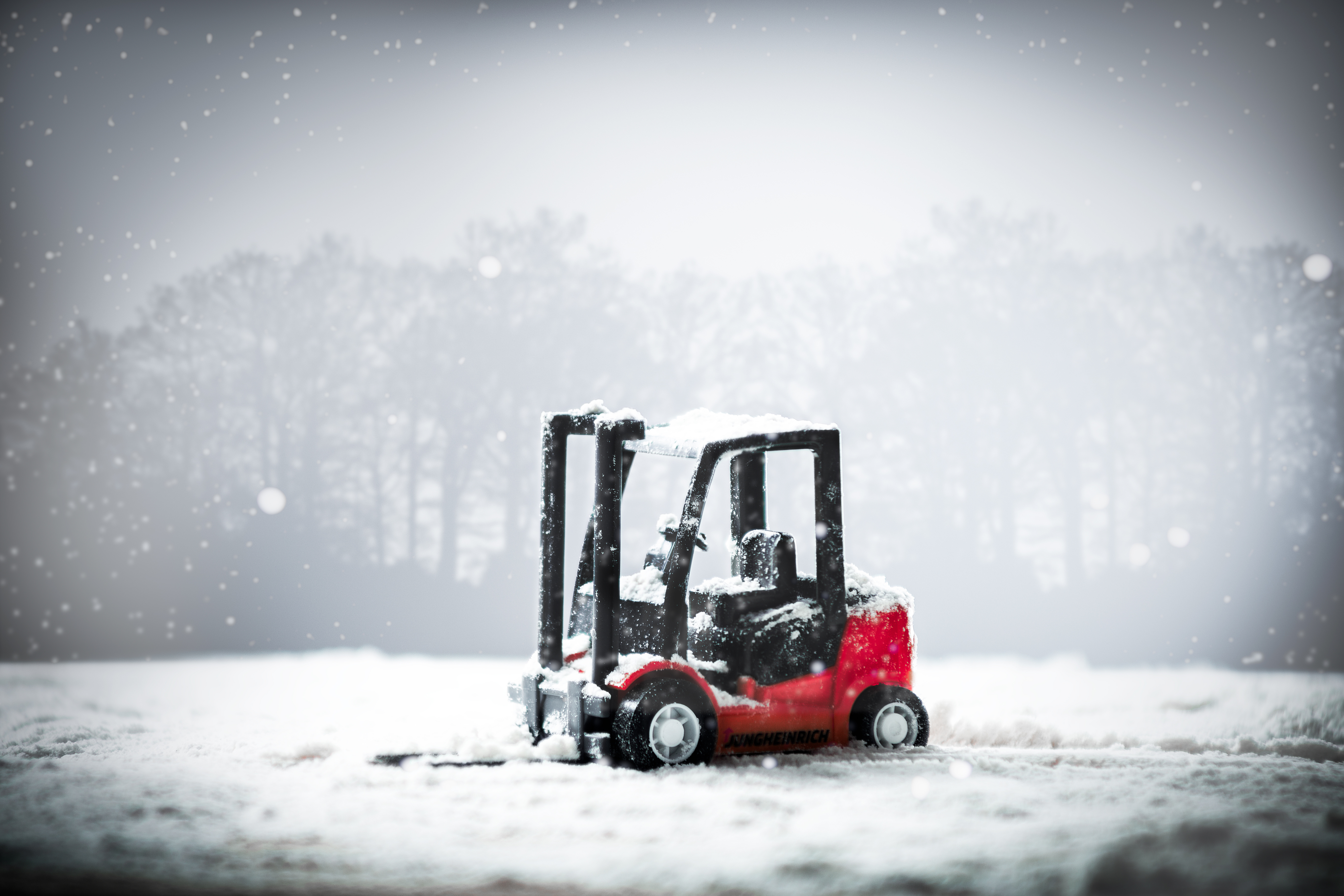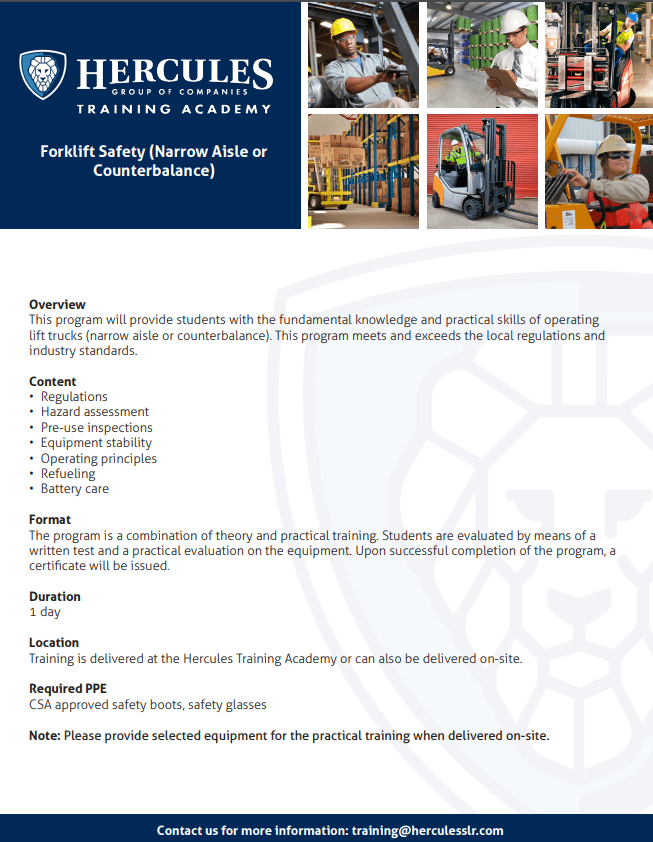Winter Forklift Safety Tips
Winter Forklift Safety Tips
Hopefully, your car is fully prepared for winter—What about your forklift?
Winter in Canada can be a beautiful thing, fresh layers of glistening white snow coating trees and a shiny layer of frost on the grass…But as Canadian’s we know it’s not always quite that glamorous. Canadian winters require a lot of planning and preparation – It means it’s time to dig the shovels out from the back of the shed, making sure the winter tires get on the car in time and pull the winter coat from the back of the closet.
As good as Canadians have come to be at preparing for winter, there are some things that still may fall through the cracks. You may not realize the extra safety precautions that need to be taken when operating a forklift in the winter.
Read on to learn how to stay safe while operating a forklift this winter!
Prepare Your Forklift for Winter
Forklift operators should give their forklift a detailed inspection
to minimize the chance of experiencing a forklift breakdown and getting
stuck in the middle of an aggressive winter storm. Getting a tune-up
ahead of winter is always recommended. And of course, as always ensure
you are up to date on all of your scheduled service visits and
inspections. Things to ensure are in tip-top shape before braving the
winter months are:
- Tires: Check tires for proper air pressure (for pneumatic tires) and to ensure that there is sufficient depth on your treads (needed for both solid and air-filled tires). For forklifts operating in snow or ice specialized forklift chains can be installed to provide extra grip
- Lights: Winter doesn’t just bring cold weather, it also means darker days – So ensuring your lights are in working order is something you may not think of, but is especially important. Tip – If your forklift uses halogen lighting it may be a good time to consider upgrading to LED, which lasts longer, shines brighter and is not affected by freezing temperatures or the vibrations created by your forklift during operation!
- Hydraulics: Frigid winter temperatures can cause joints to stiffen up so ensure all of your moving parts are well-lubricated.
- Cabs: If your forklift has an enclosed cab and windshield (recommended for winter conditions), be sure the heater and windshield wipers are working correctly and that all latches are lubricated.
- Cooling System: It is important to ensure there is the correct amount of anti-freeze used in the coolant system. Anti-freeze ensures that the engine will not freeze solid and block the coolant system, which can lead to a number of problems including dangerous overheating.
It’s also important to remember to allow your forklift to warm up before using it. Everyone knows you’re supposed to let your car warm up during cold weather, a forklift is no different! Allowing it to warm up lessens the chance of combustion and transmission-related problems occurring.
Ensure Forklift Operators are Appropriately Clothed
Pre-winter planning is not limited to the equipment itself, especially for work that takes place outdoors. It’s important to make sure operators are equipped to do the job under more challenging conditions. Clothing needs to be able to protect operators from snow, ice, wet and slippery conditions, cold or strong winds and limited visibility.
To protect the most vulnerable areas of the body against frostbite (i.e., the ears, nose, fingers, and toes) operators need to wear appropriate protective gear including a warm hat, gloves, face mask, and water-proof boots while operating a forklift (or during most work, for that matter!) Layers are the key here, so pairing these items with wind-proof, water-resistant and high visibility outerwear, is the best way to tackle the cold and wet conditions found throughout the winter months.
Always keep in mind typical year-round PPE such as protective eyewear, hard hats, steel-toe boots or safety gloves and ensure bundling up isn’t inhibiting your ability to wear those things. You may need to purchase specialized PPE meant to keep you safe & warm at the same time.
Operator Training and Education
Beyond supplying the proper equipment to your employees, it’s essential to educate your operators with the fundamental knowledge and practical skills of operating a forklift. The Hercules SLR Training Academy can deliver this training (and more!) at The Hercules Training Academy or it can also be delivered on-site. The content covers:
- Regulations
- Hazard assessment
- Pre-use inspections
- Equipment stability
- Operating principles
- Refueling
- Battery care
When it comes to managing the additional challenges posed by the winter weather, these steps can help navigate you through your shift ensuring you’re keeping the most important elements in mind:
Before Your Shift
- Conduct a proper pre-operation inspection of the forklift. Record and report any issues.
- Check the weather outside and make sure to adjust driving habits to current weather conditions.
- Install and check all winter items – Including weatherized PPE and things like tire chains if needed on your forklift.
- Avoid cold starts by allowing the forklift to properly warm-up before operating.
During Your Shift
- Only travel as fast as the weather conditions permit – Slow down if needed and drive carefully.
- Remove any accumulation of snow on windscreens, lights, etc. to maintain proper visibility.
- Be sure to stop working if conditions deteriorate such as: slippery driving conditions (don’t let this be you!), limited visibility, etc. – Safety first!
- Try to avoid short run times (less than 30 minutes) as forklift engines tend to run a richer fuel mixture during the first 20 minutes of operation. This means it is possible for water vapor to accumulate in the engine oil and exhaust system in the cold, as evaporation isn’t possible. Try to plan your day so you can do multiple forklift tasks at once instead of scattered throughout the day.
After Your Shift
- Clean the forklift – Remove all snow, dirt, and salt in order to prevent rust and corrosion.
- Make sure to plug in the forklift’s block and/or battery heater to avoid issues at the start of the next shift.
- Park the forklift in a warm and dry place in between uses to avoid issues related to ice formation.
Through our Hercules Training Academy, we offer an extensive suite of high-quality safety training and certification courses. Customized classrooms and specialized training equipment enable us to provide an even higher quality of service than ever before when it comes to safety training.
Whether you’re looking for initial or refresher training, we provide practical, hands-on courses designed to exceed the minimum safety requirements.
Our courses can be customized to fit your workplace’s specific needs. We are always willing to design a course (or multiple courses) specifically for you!
If you’re interested in building a customized training program, please get in touch. One of our training representatives would be happy to help you get started. [email protected].

——————————————————————————————————————————————
The Hercules Group of Companies encompasses a wide portfolio of products and services across 7 diverse companies.


